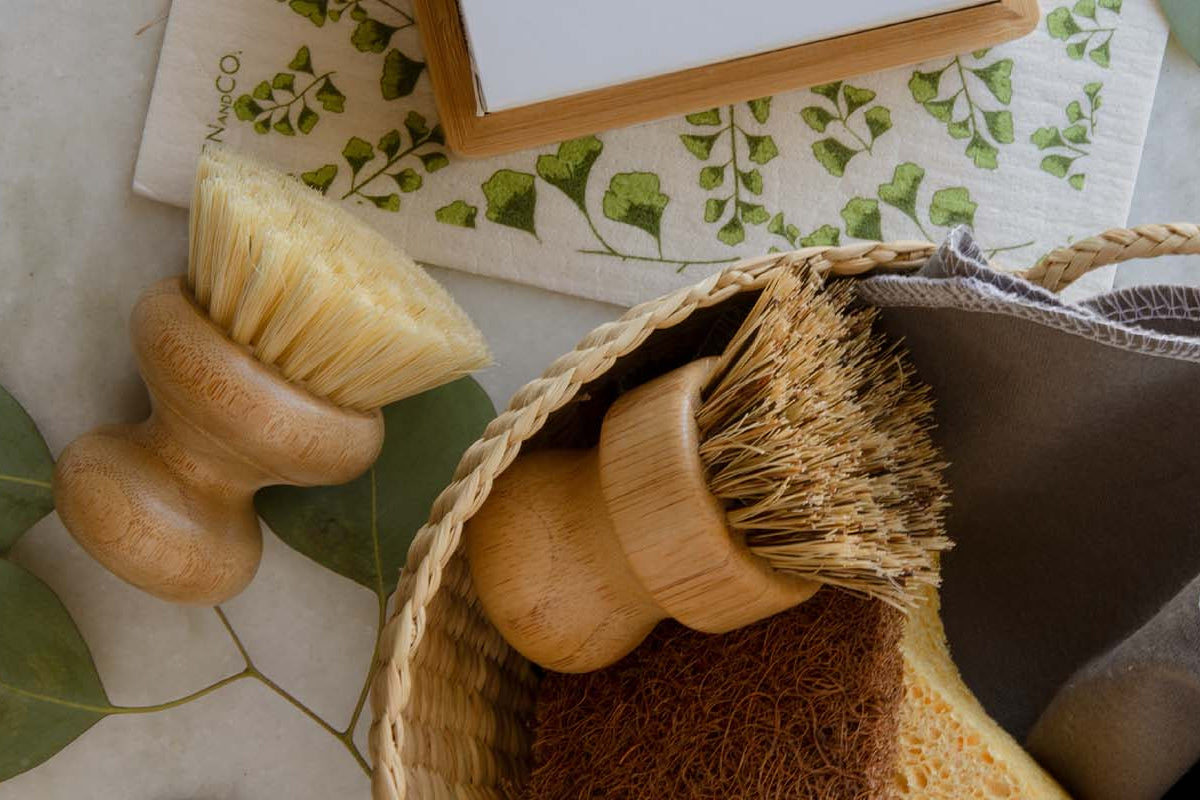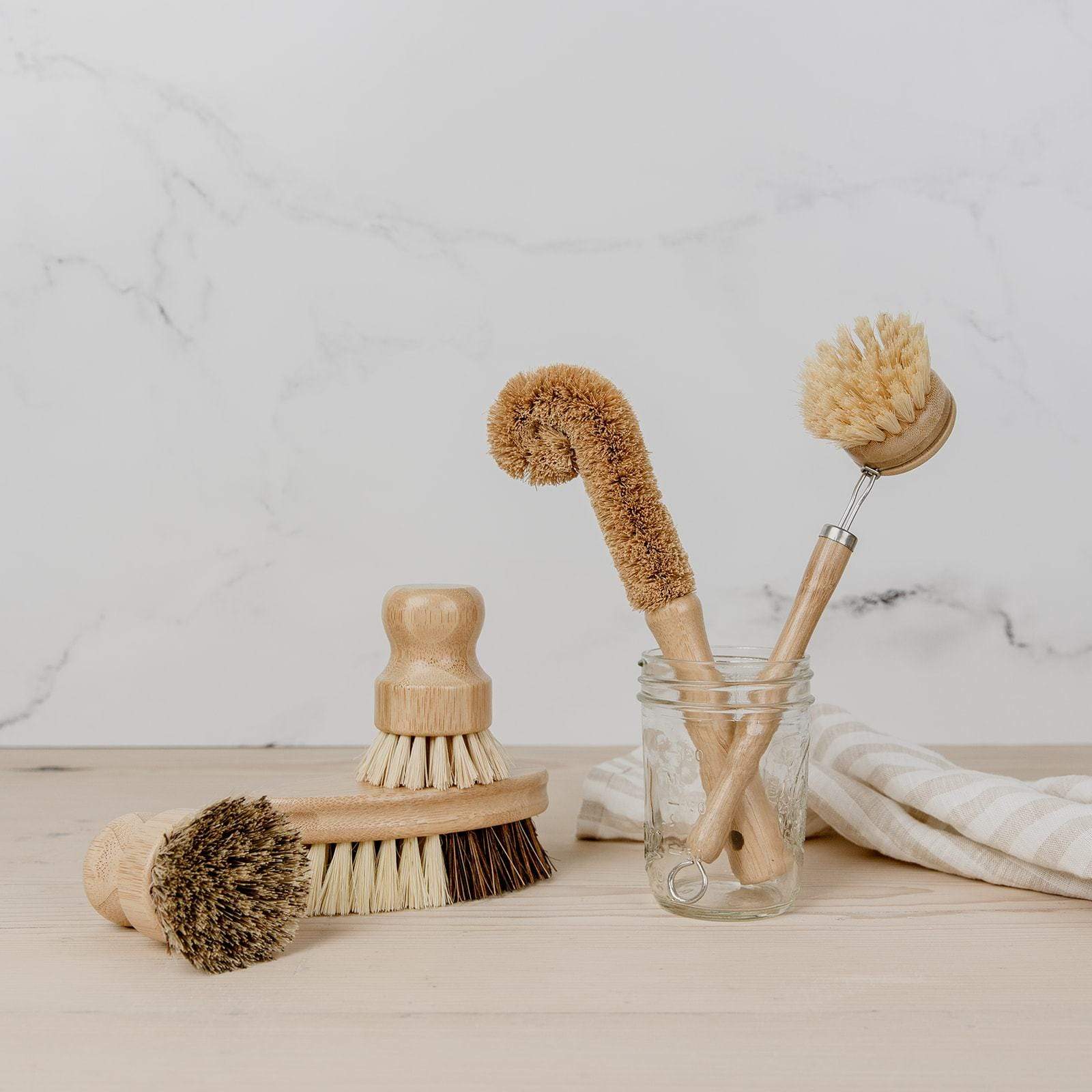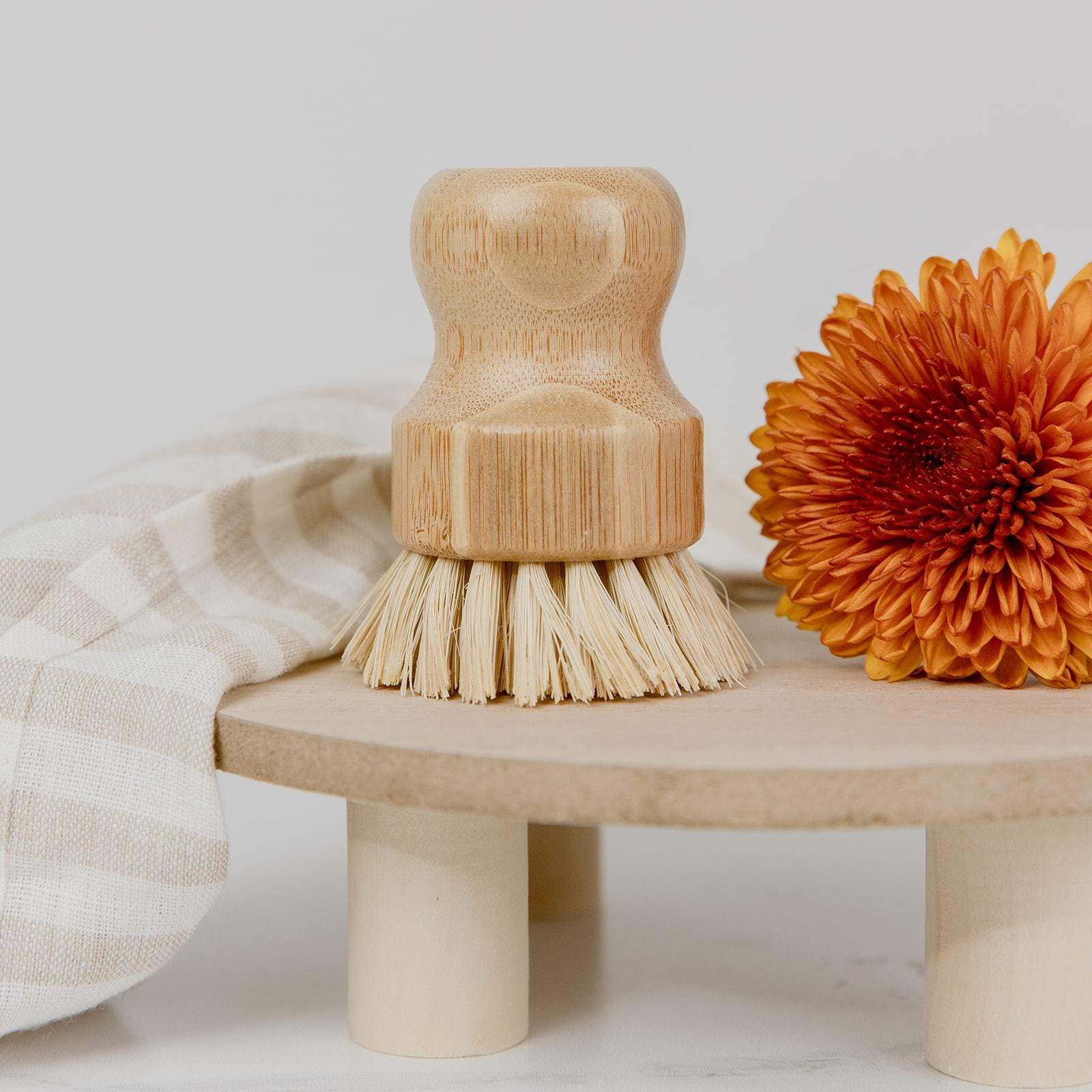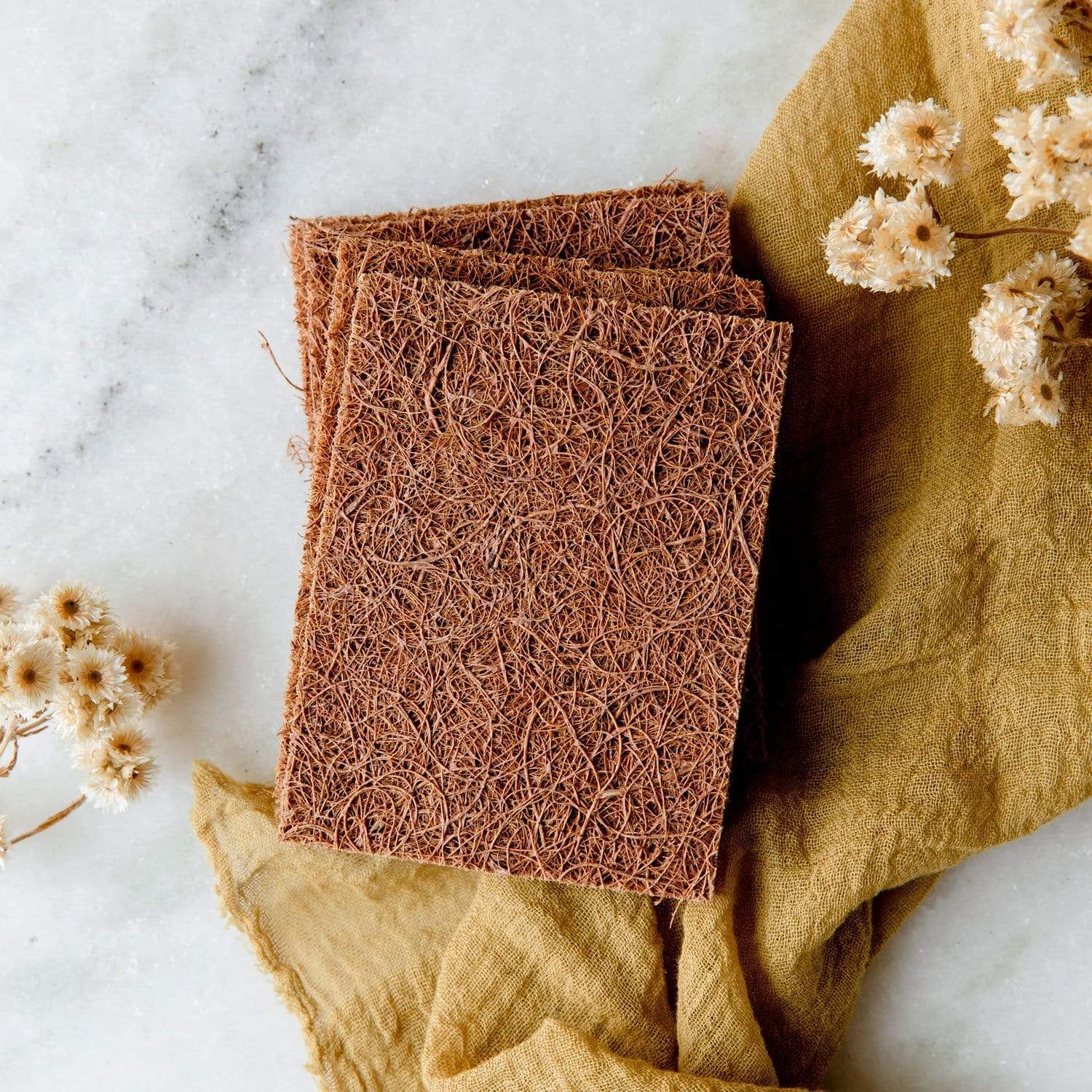An Easy Stress Relieving Sustainable Kitchen Routine To Try Now

Get your dishes and countertops clean as a whistle with earth-friendly products with this sustainable kitchen routine.
Estimated Read Time: 7 minutes
Life is busy and adulting is hard. And one thing that seems to always be there is chores, especially dishes.
No matter how long you spend doing dishes and cleaning the kitchen, there’s always more! And while we wish there was a way to (sustainably) never need to do dishes or clean your counters again, you just gotta do it.

But the good news is, we’ve created a sustainable kitchen routine that can hopefully help you streamline the process and get them done faster so you can enjoy more of what makes you happy!
The best part of this routine is it can be adjusted to fit your needs! Wipe things down first, wash dishes second, whatever works for you!
Keep Reading For The Best Sustainable Kitchen Routine
1. Refillable Plastic-Free Dish Soap For Your Zero Waste Kitchen Routine

If you’re switching from traditional bottled dish soap it can be easy to doubt the power of a dish soap bar. From the same great makers of our bestselling shampoo & conditioner bars, Suds & Co brings you a vegan, plastic free dish soap with all the cleaning power of suds. And coconut oil, lye, and essential oils. These ingredients come together to make a dish soap that is soft on dishes but tough of grease. It comes in a reusable tin container but can also be purchased without the container.
To use:
Simply wet your dish brush of choice, rub on the dish bar until you’ve accumulated the desired amount of suds, then wash dishes as normal. Be sure to drain the soap dish occasionally to prevent the soap from sitting in water.
Soap Storage
To keep your soap in tip-top shape and always ready to tackle the never ending line of dirty dishes, be sure to store it properly. Options include these soap lifts made with a corn-based plastic that keep your soap bars off a surface, or our completely compostable soap dishes with a bamboo divider that keeps the soap free from sitting in water water that can shorten the life of the soap.
To use:
Rest soap on soap dish. Be sure to remove soap, drain, and clean every few weeks.
2. Dish Brushes For A Zero Waste Kitchen Routine

Now comes the most important of getting those dishes done — scrubbing off the food and germs! There are entire aisles devoted to the different ways to scrub your dishes; the options are endless. Unfortunately, most of them are not sustainable and are made with plastic, but don’t you worry, we got you covered with any dish brush you might need!
To use:
Once soap is applied to brush (or dish), scrub dishes as normal until clean. Each brush can be composted at the end of its life — see long handle dish brush for specific instructions.
Long Handle Dish Brush — Made from Agave plant fiber, metal, and sustainable teak wood with a replaceable head, this brush can handle the toughest of jobs and comes with a metal hook for easy hanging. At the end of its life, the metal can be recycled and the bamboo and agave fibers composted.
Short Handle Dish Brush — With a handle made from Moso Bamboo and the bristles made from Agave plant fibers don’t let the size of this little brush fool you into thinking it isn’t tough. It can handle any of your dish washing needs! Compostable at the end of its life.
Vegetable Brush — With a bamboo handle and sturdy Tampico fibers made from Agave & Yucca, this versatile brush can handle anything from delicate vegetables to tough laundry stains. Biodegradable and compostable.
Bottle Brush — Doing the dishes only gets worse when you have tall glasses and water bottles that can’t be reached with brushes (or hands). Naturally antibacterial bamboo and coconut fibers come together to make sure to clean all those hard to reach places, saving you time and energy. Biodegradable and compostable after use.
Pot Scrubber — With a bamboo handle and plant fiber bristles, this little brush can tackle any kitchen situation you throw at it and it’s durability means it’s great for burnt stuck on food. To extend the life of your scrubber, keep the wood handle from soaking in water for an extended period of time and occasionally soak it in a vinegar solution to keep it clean. Can be composted at the end of its life.
Coconut Kitchen Scourers — While not technically a dish brush, sometimes a brush isn’t always up to the task and you need to call in a good sponge to get the job done right. Enter these coconut kitchen scourers made from coconut coir waste and natural rubber latex. They’re tough on dirt but gentle on pots and pans. At the end of its life you can repurpose it to a soap dish or compost it.
To use:
Apply soap directly to the sponge and proceed with washing dishes or wipe the sponge on already soapy dishes.
3. Cleaning Supplies For A Zero Waste Kitchen Routine

After the dishes are done, get a quick countertop and stove wipedown done and you’re good to go! It may feel like an extra step in the routine, but wiping down the counters everyday means an extra 5-10 minutes each day VS spending hours trying to clean a big mess at the end of the week/month.
Antibacterial coconut oil and dirt dissolving baking soda are two powerful yet non-toxic ingredients that come together to create this multi-functional 3-in-1 cleaner. And if you happen to run out of laundry detergent and/or dishwashing detergent, never fear! This solution can be used for both!
Circular Bodies Multi-Use Zero Waste Cleaning Powder

Antibacterial coconut oil and dirt dissolving baking soda are two powerful yet non-toxic ingredients that come together to create this multi-functional 3-in-1 cleaner. And if you happen to run out of laundry detergent and/or dishwashing detergent, never fear! This solution can be used for both!
To use for cleaning:
Mix 1 teaspoon of the powder in a glass spray jar with 1 cup warm water and stir softly to dissolve. Once the powder has dissolved, spray on the desired surface and wipe down with a brush, sponge, or unpaper towel.
To use for laundry/dishwasher:
Put 2 tablespoons of powder in the washer or dishwasher and run as normal.
Paper Towel Alternatives: Unpaper Towels

Although paper towels are easy to reach for and can be made from recycled materials, those are not the most available options at the store — and they can be more expensive. Additionally 17 trees are cut down and 20,000 gallons of water are used for every one ton of paper towels produced. And while unpaper towels need to be washed they still use less water than needed to make paper towels. These 100% cotton flannel towels are an easy replacement! They become more absorbent with each wash and can be reused endlessly. If they start to fray or fade, turn them into rags.
The beauty of most of these products and sustainable products in general is that most of them are so versatile and have multiple uses, as does this sustainable kitchen routine. If you prefer to clean and wipe down first then switch this around!
The dish brushes can all be used in other areas around the house: laundry stains, countertops, even bathrooms! The sponges can be used to clean, as paper towel replacements, or even to wipe down dishes with. The soaps can even be interchanged! Just be sure to designate a brush for a specific room — you don’t want to be using the same brush for your dishes as you are in your bathroom.
We hope that this sustainable kitchen routine saves you time, energy, and can help reduce your stress just a bit.








